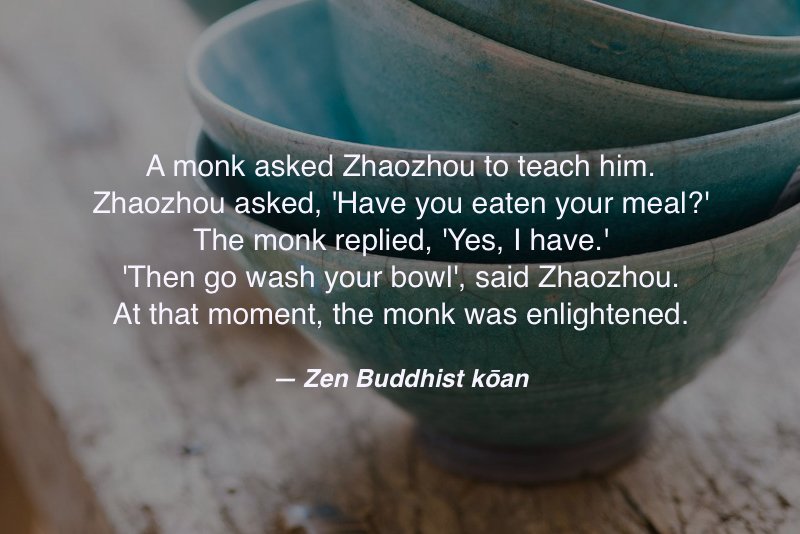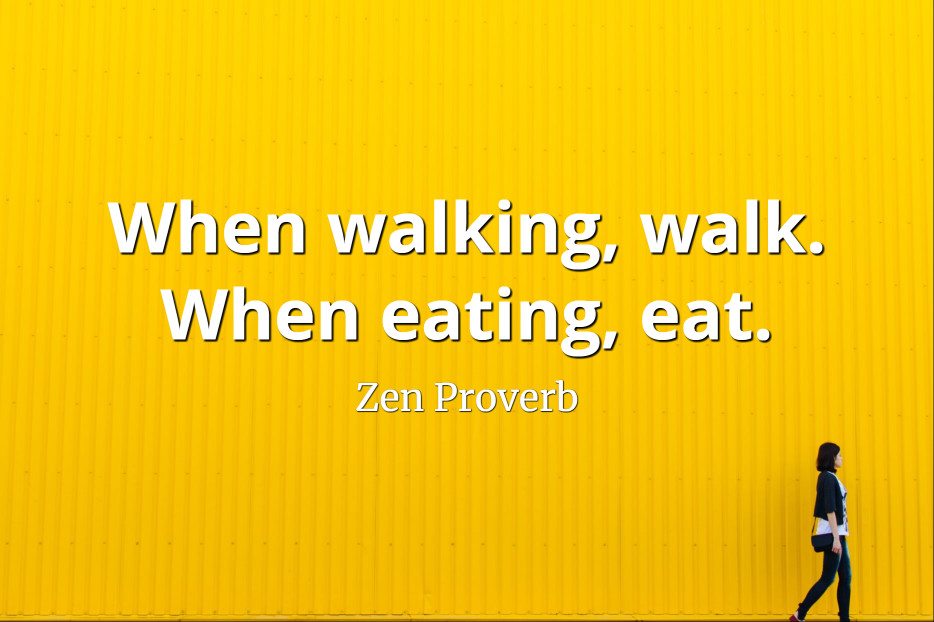Zen and Budha quotes are used everywhere. You can’t open your social media account without seeing a meme using one of the quotes in your feed. Other religions do have quotes and passages about food but none are as simplistic and powerful without entwining their own theology. If I owned a restaurant, I would probably use a couple of those quotes on the menu.
“When drinking the water, remember the source. When eating your meal, remember the hands that prepared it.”
The Power of Simplicity in Zen and Buddha Quotes
Zen Buddhism emphasizes simplicity and directness. This clarity and conciseness make the teachings particularly impactful. Instead of entangling readers in complicated theological concepts, Zen and Buddha quotes usually get straight to the point, delivering powerful insights in just a few words.
“The secret of Zen is just two words: not always so. When eating, just eat. When meditating, just meditate.”
The Universality of Zen and Buddha Teachings
The teachings of Buddhism focus on universal aspects of human experience. Topics like suffering, impermanence, and the pursuit of inner peace resonate with people from various cultural and religious backgrounds. This universal applicability extends their reach and enhances their impact.
“To truly experience the essence of food, one must encounter it with presence, not evasion.”
Zen and Buddha Quotes as Practical Wisdom
Zen and Buddha quotes often provide practical wisdom that individuals can apply in everyday life. They address common challenges and dilemmas, offering insights that can foster personal growth and improved wellbeing. Rather than providing abstract concepts, these quotes often relate directly to our daily experiences.
“In the sound of the chewing, there is only chewing. In the sound of the bell, there is only the bell. The simple act of being present reveals the extraordinary in the ordinary.”
Emphasis on Mindfulness and Presence
Buddhism places great emphasis on mindfulness and being fully present in each moment. This teaching resonates strongly with many people living in a fast-paced, modern world where distractions abound. The quotes serve as reminders to slow down and engage fully with each moment.
“Eating mindfully, we come to understand the universe – the interconnectedness of grain, of labor, of earth, sun, and rain. The whole cosmos is revealed in a single grain of rice.”
The Non-Dualistic Approach of Zen
Zen Buddhism embraces a non-dualistic view of reality. It transcends typical either/or distinctions, providing a refreshing and liberating perspective that challenges conventional ways of thinking. This unique approach can add to the resonance of Zen quotes.
As you walk and eat and travel, be where you are. Otherwise, you will miss most of your life.” – Buddha
Encouraging Personal Experience and Exploration
Buddhism encourages personal exploration and direct experience over blind faith. The quotes often act as guides to self-discovery rather than as dogmatic assertions. This emphasis on personal exploration empowers individuals, inviting them to engage directly with the teachings.
While some people may find Zen and Buddha quotes more powerful, other religious or philosophical traditions also offer profound wisdom and insights. The impact often depends on an individual’s personal resonance with the teaching or principle conveyed in the quote.
“Remember, the way of Zen is not found in complexity, but simplicity. The simple acts of eating, drinking, and meditation can all be gateways to enlightenment.”
More Quotes
“Eating and drinking are not separate from the act of living; they are all aspects of the single, seamless process of life.” – Zen Proverb
“In Zen, mealtime is meditation time. As the tea is brewed, as the rice is cooked, mindfulness brings peace and fulfillment.”
“When drinking the water, remember the source. When eating your meal, remember the hands that prepared it.”
“Just as a candle cannot burn without fire, man cannot live without a spiritual life. Food nourishes the body, meditation nourishes the spirit.” – Adapted from Buddha
“Meditation is not evasion; it is a serene encounter with reality.” – Thích Nhất Hạnh. Similarly, “To truly experience the essence of food, one must encounter it with presence, not evasion.”
“The secret of Zen is just two words: not always so. When eating, just eat. When meditating, just meditate.”
“In eating, a monk is free from thoughts of desire and understands the right amount. In meditation, similarly, one understands the right amount of effort.”
“When eating or drinking, become the person who eats or drinks. When meditating, become the meditation. Be one with your action.”
“To understand the nature of a rice grain is to understand the nature of the universe. In mindful eating, in meditation, we find enlightenment in the ordinary.”
“If your mind is distracted when eating, you only taste a fraction of the meal. If your mind is distracted during meditation, you only experience a fraction of the truth.”
“A meal without mindfulness is like a body without a soul. Similarly, meditation without mindfulness is like a journey without direction.”

More Sources:
Reading Guide
- “How to Cook Your Life: From the Zen Kitchen to Enlightenment” by Dōgen and Kosho Uchiyama. This is a 13th-century manual written by the Zen master Dōgen, providing instructions on how to incorporate mindfulness and gratitude into cooking and eating.
- “The Zen of Eating: Ancient Answers to Modern Weight Problems” by Ronna Kabatznick. This book bridges the gap between spirituality and our relationship with food, offering insight from a Zen perspective.
- “Instructions for the Zen Cook” by Zen Master Dōgen. In this work, Dōgen provides guidance on how to maintain mindfulness while preparing and consuming meals.
- “Mindful Eating: A Guide to Rediscovering a Healthy and Joyful Relationship with Food” by Jan Chozen Bays. Written by a Zen master, this book provides insight into our eating habits and provides exercises to develop a healthier relationship with food.
- “The Art of Simple Food: Notes, Lessons, and Recipes from a Delicious Revolution” by Alice Waters. While not strictly Zen or Buddhist, Alice Waters’ philosophy on food has a simplicity and mindfulness that align with Zen principles.
- “The Enlightened Kitchen: Fresh Vegetable Dishes from the Temples of Japan” by Mari Fujii. This book introduces the cuisine served at Zen temples, focusing on their traditional vegetarian dishes.

